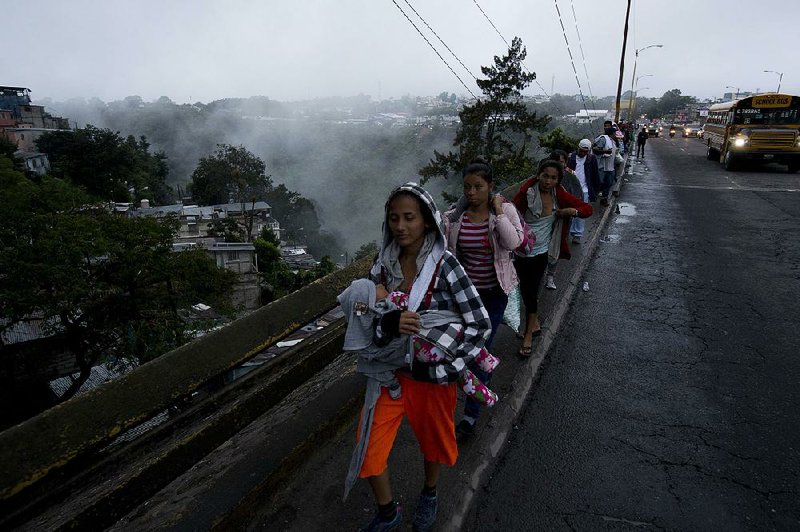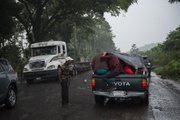WASHINGTON -- President Donald Trump threatened Thursday to summon the military to close the U.S.-Mexico border and upend a trade deal, expressing mounting frustration with a large caravan of migrants from Honduras making its way toward the United States.
In morning tweets, Trump repeated vows to stop U.S. aid to Central American countries that do not disband the caravan and issued a fresh threat to the Mexican government, which said Wednesday that it would treat those in the caravan no differently than it does other migrants.
"In addition to stopping all payments to these countries, which seem to have almost no control over their population, I must, in the strongest of terms, ask Mexico to stop this onslaught -- and if unable to do so I will call up the U.S. Military and CLOSE OUR SOUTHERN BORDER!" Trump said in one tweet.
Trump made a similar vow to stop aid over another large migrant caravan in April, but didn't follow through. The group largely petered out in Mexico.
In another tweet Thursday, Trump suggested that the "onslaught" of migrants could undermine a recently announced reworked trade deal with Mexico and Canada, writing that immigration is "far more important to me, as President, than Trade."
The new deal, which replaces the North American Free Trade Agreement, has yet to be signed by the three countries. Congress is not expected to ratify it before next year.
Trump's comments come as he has been urging fellow Republicans to make immigration a central issue in the closing weeks of their midterm election campaigns and blaming Democrats for his inability to pass immigration legislation in the GOP-controlled Congress.
"All Democrats fault for weak laws!" Trump said in one tweet Thursday.
Later Thursday, Mexico dispatched additional police to its southern border after the Casa del Migrante shelter on the Guatemalan side of the border reported that hundreds of Hondurans had already arrived there.
Apparently pleased with that response, Trump later retweeted a BuzzFeed journalist's tweet of a video clip showing the police deployment, adding his own comment: "Thank you Mexico, we look forward to working with you!"
Mexican officials said the Hondurans would not be allowed to enter as a group and would either have to show a passport and visa -- something few have -- or apply individually for refugee status, a process that can mean waiting for up to 90 days for approval. They also said migrants caught without papers would be deported.
Immigration is certain to be on the agenda today when Secretary of State Mike Pompeo is scheduled to meet with outgoing Mexican President Enrique Pena Nieto.
The immigration issue also sparked a lively confrontation Thursday at the White House between chief of staff John Kelly and national security adviser John Bolton, according to news reports.
White House press secretary Sarah Huckabee Sanders said members of the administration were "not angry at one another" -- that the Trump team is "passionate about solving the issue of illegal immigration."
She turned the table on Democrats, saying they have failed to help the administration address the growing immigration crisis.
"They should be ashamed for pushing an open borders agenda and are only doing this for strictly political reasons," she said in a statement.
Trump's frustration appears to stem in part from record levels of migrants entering the United States with children in the three months since his administration stopped separating families at the border.
The Washington Post reported this week that Border Patrol agents arrested 16,658 family members in September, the highest one-month total on record and an 80 percent increase from July, according to unpublished statistics from the Department of Homeland Security.
In his tweets Thursday, Trump warned that the latest caravan includes "MANY CRIMINALS."
Marcelo Ebrard, who is set to become foreign relations secretary when President-elect Andres Manuel Lopez Obrador takes office Dec. 1, said Trump's tweets need to be understood in the context of the upcoming U.S. midterm elections.
"The electoral process is very near, so he is making a political calculation," Ebrard said in an interview with Radio Centro.
Trump's stance, he said, was "what he has always presented," adding he saw "nothing surprising in it."
Current Foreign Relations Secretary Luis Videgaray was also sanguine and viewed things through the lens of U.S. politics.
"Nobody likes them [Trump's comments]. There's no reason to give them greater transcendence or importance," Videgaray said from the United Nations where he sought the world body's help processing asylum requests from the migrants. "What is important to us is the migrants, respect for human rights, their due protection, particularly the most vulnerable."
MILITARY ON BORDER
Earlier this year, Trump criticized a similar caravan making its way to the U.S. That episode caused a spat between the United States and Mexico, and Trump deployed National Guard troops to the border.
The Posse Comitatus Act forbids using the military for civilian law enforcement duties outside military bases in the United States.
Military officials instructed troops to alert border agents if they encountered migrants, rather than intervene themselves, except in cases of self-defense. The Army also restricted the use of weapons to personnel who may need to use force.
The Government Accountability Office looked at mobilizations on the border under Presidents George W. Bush and Barack Obama and found that Homeland Security didn't understand what its military support could and could not do, which frustrated the agency and Pentagon officials.
The migrants -- who say they are traveling in search of jobs, better lives for their families and to escape from gang threats and violent communities -- were blocked at the Honduras-Guatemala border for several hours earlier this week by Guatemalan police in riot gear before being allowed to pass.
U.S.-bound migrant caravans have been going on for years -- with traveling in numbers seen as offering protection from assaults, robberies, even shakedowns by police. They're also a cheaper alternative to the $7,000 to $10,000 that smugglers, charge for passage to the border, noted Stephanie Leutert, director of the Mexico Security Initiative at the University of Texas at Austin.
The group has swollen in size since leaving San Pedro Sula, one of the world's most dangerous cities, last Friday. By some estimates, it now contains more than 3,000 people.
By Thursday, the caravan had dispersed a bit, with the youngest and strongest of the migrants walking ahead together, some boarding buses or trying to hitch rides. On a bridge leading out of the Guatemalan capital, Hondurans marched single-file behind a woman holding a baby in her arms as a school bus rumbled past.
Juan Escobar, 24, said he had heard about Trump's comments but said they would not dissuade the migrants from continuing their journey.
"Only God on high can stop us," Escobar said.
Carlos Lopez, 27, said he was concerned by Trump's threats, but "you have to keep fighting."
Information for this article was contributed by John Wagner, Alex Horton and Joshua Partlow of The Washington Post; and by Sonia Perez D., Peter Orsi, Mark Stevenson and Paul Wiseman of The Associated Press
A Section on 10/19/2018

